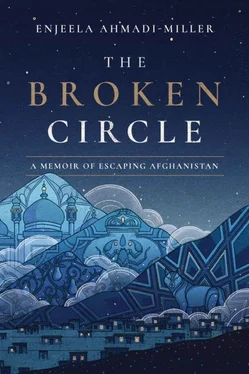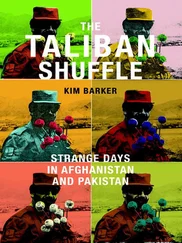We told him story after story as he puffed away on his pipe, taking it all in. He finally spoke up.
“Masood told me quite a bit about you guys,” he said.
We all grew silent.
“He said you were vigilant for each other. He said you took good care of each other. Even when Enjeela was bitten by the scorpion, you all rallied around her to make sure she had what she needed. He told me about the little girl in the village—”
“Mina,” I interjected.
He pointed the mouthpiece of his pipe at me. “Yes, I believe that was her name. He told me how much you all wanted to save her. It’s a shame she didn’t have a strong family like you guys do,” he said as he rested the mouthpiece of the pipe back on his lips. “That wasn’t her fault.” He shook his head gently before taking another puff.
“Her family sold her,” Zulaikha said. “Sold her!”
“You are very fortunate,” he said, glancing at each of us. “Even when you had very little, you had each other.”
“We still have each other,” Zia said.
That was true. “You have all learned some important things,” Padar said. “About yourselves and one another.”
“Like what?” I said, always willing to stir the pot of controversy.
“That you can trust each other with your lives. That’s why I have fought so hard for us to be together. All we really have in this world is each other.”
The train wheels clicked loudly in the space of our silence as we considered this. Our family had been our strength through every difficulty and trial on the road, a sinuous, four-stranded cord that bound us together in strength and love—the whole, far stronger than each of us alone.
The rest of the ride into New Delhi, Padar told us stories, recited more poems, and regaled us with histories of India. It all sounded wonderful, and I wished Mina had been there to feel the comfort of Padar’s voice.
We slept in the fold-out beds of our compartment as the train rumbled through the night. The last thing I remembered before nodding off was Zia snoring softly in the bunk above me. I awoke later in the early darkness, and the rhythmic swaying of the car tried to rock me back to sleep. But I couldn’t stop thinking about finally seeing Mommy and the rest of my family.
What would New Delhi be like? What if I didn’t like the new house? Or if Mommy just didn’t want me around? We could band together and travel back to Afghanistan, couldn’t we? We had done it once. Why not twice? The war wouldn’t go on forever. My mind continued to run down these roads of speculation until the light of the sunrise streamed through the window, and Zia stepped on my leg as he jumped down from the top bunk.
“Ouch! Watch what you’re doing,” I said, trying not to wake the others. I pushed his foot off my leg. He leaned down so I could see his face.
“I thought that was the ladder the porter left,” he said with his impish grin. “You do make a good stepping stool.”
“Shut up.”
“You’re the one who’s making noise,” he teased. “You’re always making noise, do you know that?” He tried to pinch my arm just to make his point.
“Stop it, you idiot. Leave me alone.” I squealed, slapping his hand away and giggling.
“Shhhh,” he said, holding a finger to his mouth. “You’ll wake everyone.” He couldn’t hide his smile. He left the compartment to find the bathroom.
I rolled away from Zulaikha in the bed beside me and propped myself up on an elbow. Laila rubbed her eyes in the bed across from me while Padar snored in the bunk above her.
“Why are you so noisy?” Laila said.
“I’m just trying to wake you so you can be mad at me.”
“Figures. It worked.”
“Can’t you be quiet?” Zulaikha said from behind me.
“Hey, Zia stepped on me and it hurt.”
“He should have stepped on your mouth,” Laila said, holding her hand over her eyes to keep in the darkness.
Zulaikha sniggered. Then I laughed too.
Another day together had begun. We’d soon be eating, then playing cards, telling jokes, and arguing over something minor.
Before lunch we changed trains. We made our way across a crowded platform to a train that would connect to New Delhi. We had seats that faced each other. They were comfortable and easy to doze in. The train made many stops, and as we drew closer to our destination, young people began to board. They played music. Some had brought cassette recorders that blared a wild, exciting sound. The young men all sang along to the bouncy music. One boy even got up in the aisle and danced.
“They are university students,” Padar said.
“Did you sing like that when you went to university?” Laila asked.
He puffed on his pipe. A glint of joy came to his eyes as if he had a flash of good memories. He didn’t say anything for a long moment, then pointed the tip of his pipe at us. “It’s a great time, going to university. Every generation finds their way to have adventures. You’ll each have your own experiences.”
“Haven’t we had enough adventure?” Zulaikha said. “I just want to sleep in one bed for more than a week at a time.”
“Is that all you think about,” Zia said.
She sneered at him. “If I had my own bedroom, I wouldn’t have to listen to you snore.”
Padar waved his hand in the air. “Okay, that’s enough.”
“Do you think we’ll have our own bedrooms?” I asked him. He hadn’t said much about where Mommy lived. What kind of house she had, or how big it was.
He shrugged. “I’ve never seen it.” He reached into his shirt pocket and pulled out a square of paper with an address on it. “She told me some time ago that it would be large enough for all of us. This is as much an adventure for me as it is for you.”
We all grew silent, just as the music and dancing grew louder. I could only think of the house in Kabul and Shura Street before the Soviet tanks occupied the city. Would there ever be a place as pleasant and happy and carefree?
The wheels clacked under our feet as we sped along. The raucous beat, the incessant clapping, and the energetic singing in the aisles created a driving impulse inside me to join in, to forget the fear and uncertainty that had been festering for so long. I remembered the shama, and the peaceful spirit I’d found there deep in the cave. And while this experience on the train was different in kind—joyous and raucous—it was of the same nature: people finding happiness in their lives. We had left so much happiness behind in Kabul, and today’s train ride was a portent of gladness to come. I was excited, anticipating what my new life in India would open up to me.
Meanwhile, Padar chewed unconsciously on the stem of his pipe, making a clicking sound that told us all he was deep in thought. He fingered the scrap of paper with the address written on it as he stared out the window.
We pulled into the New Delhi Railway Station very late in the afternoon. We stepped off into a tangle of people calling, shouting, searching the crowd for familiar faces. Others hustled their bags or suitcases and packages, some with bundles under their arms, as they raced to make a connection. Children ran and jumped. I heard laughter and crying, and dogs scooted around, dashing between people’s legs, hunting for food. Humanity jammed every square inch, so Padar held my hand as we wove through the surging crowd, up the stairs, and through long queues of people waiting for tickets, till we made it outdoors.
Cabs of all sorts—vans packed with people and belongings, brightly painted rickshaws of every configuration with bundles tied to roofs—lined the street. Teens with radios on their shoulders strolled by, music blaring. Padar hailed a green motorized rickshaw, and we all piled in. He showed the driver the address, and the little car lurched forward and merged into the dense traffic.
Читать дальше













